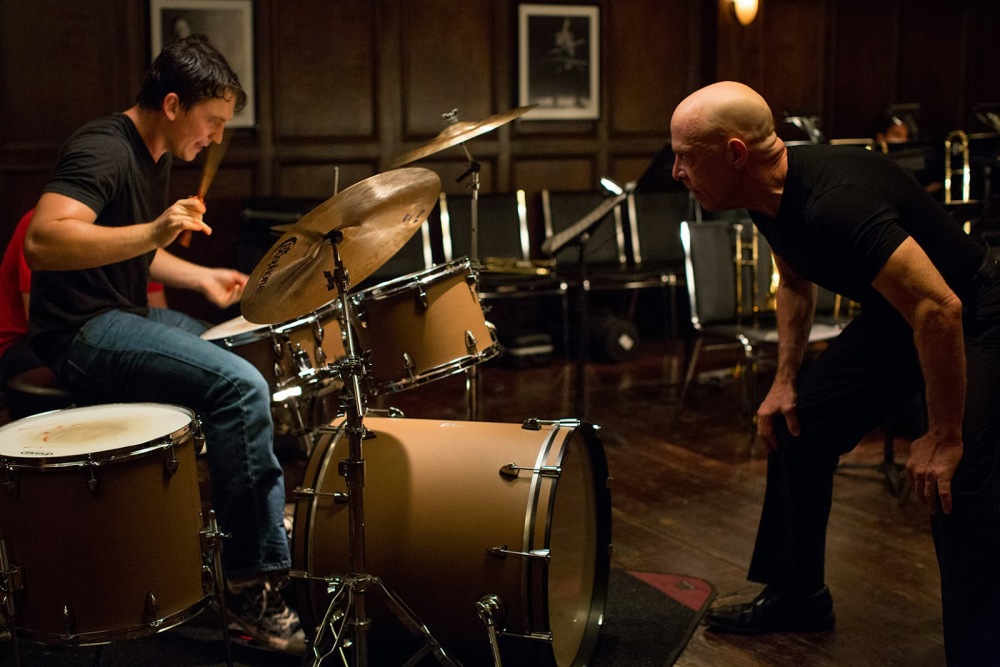
There’s this George Gershwin quote that goes, “Life is a lot like jazz. It’s best when you improvise.” And if there’s any film this year that proves that taking risks and going out on a limb is all worthwhile in both life and jazz, it’s Damien Chazelle’s impressive Whiplash.
The story of Whiplash is basic: there’s a drummer, there’s a teacher, and there’s conflict. Andrew (Miles Teller) is dead-set on becoming a great jazz drummer and Fletcher (J.K. Simmons), the professor who takes an interest in him, is pushing him to the very limit. As such, every single thing about this movie is heightened. Emotions, tempers, music, actions – everything is running on the highest level possible. It gets to the point where the whole thing works on an almost unreal level. Men yell things they would never have a chance to say in an educational scenario and people bleed more than is likely physically possible in drumming practice, but it’s all in the name of great art.
From the very minute the musicians in Whiplash start playing – with the two most prominently featured pieces being Hank Levy’s “Whiplash” and Juan Tizol & Duke Ellington’s “Caravan” – it’s nearly impossible not to get caught up in the rhythm. The visuals complement the music perfectly, but never comes across as though meticulously planned. It all fits the fluid nature of jazz. Every quick cut, every sweeping movement through the orchestra, every whip the camera makes to play out a conversation through music, it’s all meant to accompany whatever wild tempo Fletcher and Andrew are on, and attributable to incredible film and sound editing.
Even Chazelle’s seeming fondness for Gus Van Sant’s brand of back-of-the-head shots doesn’t distract from the attention to detail the man put into making this film as energetic as physically possible through his presentation of music. But the complementary performances kill just as much. Teller, who I was unconvinced by entirely in The Abysmal Spectacular Now, dives right into the physicality of the role, hitting every cue thrown at him when necessary. As impressive as it is to watch him sweat and bleed playing drums, and constantly get trashed by those around him, it’s the more reserved moments that he plays with the best. If anything, the script is what lets him down occassionally, with its weakest moments being the almost All About Eve way he gets his first shot at drumming for Fletcher’s band and, more specifically, a dinner scene with family friends in which the typical arts vs sports dichotomy is brought up.
The perfect contrast to the mostly reserved, anxious musician is Simmons’ emotionally and verbally abusive professor, who could have easily fallen into the sole role of villain, but proves to be surprisingly human, in great part because of Simmons’ long-established ability to nail the dramatic and his golden comedic timing. His homophobic diatribes against his students can get grating, and are likely to anger some audience members, but it’s hard not to find yourself laughing at some of the insults he lobs. And long after those stop coming, Chazelle hands him enough lines to make him seem like he’s not so bad after all. “There are no two words in the English language more harmful than ‘Good Job,'” Fletcher says, and it’s that kind of line that goes to show exactly why Whiplash‘s questioning of “how far is too far” actually comes across as interesting exploration rather than empty musing.
Much like Chazelle’s other film this year, Grand Piano, the script doesn’t solely work because of the fact that he’s presenting these ridiculously heightened narratives that practically beg to be called out for their lack of realism at times. It works because Chazelle has one thing especially going for him, and that is that it his films are rarely, if ever, predictable. Whenever it places itself too close to a situation that the audience might recognize too easily or see coming from a mile away, it immediately shifts gears and saves itself from a nasty stumble. This isn’t to say certain scenes aren’t almost eye-roll worthy, as watching Teller plunge his blood-soaked fist into a pitcher of ice is enough to make anyone laugh, but to believe for one moment that the film’s protagonist has got everything going his way is to make a grave mistake.
Even in its final moments, Whiplash still manages to play its audience as perfectly as the instruments on screen. If you’re not appropriately caught up in the beat as the unbelievable unfolds in some of the most sumptuous mountings of jazz musicians doing what they do best, then my friend, you’re missing out on some of the smoothest stuff on screen this year.
—
Directed by Damien Chazelle; written by Damien Chazelle; starring Miles Teller, J.K. Simmons, Paul Reiser & Melissa Benoist; 106 minutes.
Whiplash is currently in theaters everywhere.



 Derek
Derek
 Isabelle
Isabelle